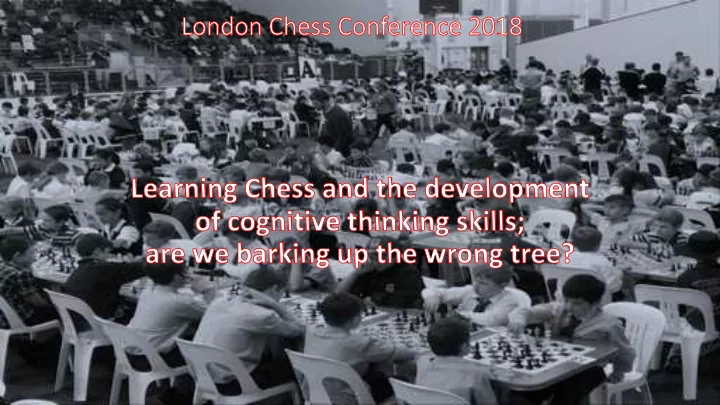

Lit Review – the number of studies relating to learning to play chess and education: ADHD (2) • economically disadvantaged (3) • behaviour problems (1) • at risk of academic failure (2) • critical thinking (2) • creative thinking (3) • cognitive development 11-15 year-olds (8) • cognitive thinking 5-11 year-olds (including • mathematics) (13). The main game – learning to play chess and the cognitive thinking skills of 5-11 year-olds
These three meta analyses identified lack of rigour as a problem: Gobet et al. (2006), • Nicotera et al. (2014) • Sala et al. (2016) • Jerrim et al. (2016) - a UK study of over 4000 students - was also critical of the lack of rigour in other studies
Martinez (2012) Examined 701 students from Grades 3 to 5 • Four groups: chess, music, both and • neither A limited number of variables were • examined The music group did significantly more • practice than the chess group Significant finding for fourth grade • students
My study in 2017 included 203 students • from Grades 1-5, sorted into 4 groups: chess, music, both and neither, with many variables examined Ethics Committee Opt-In/Opt-out • Some in the chess group did significantly • more chess There were no significant findings for any of • the study groups An ANOVA statistical analysis met the • assumptions and sample size criteria for the analysis technique Details of variables including use of the • Queensland Junior Ratings List
Piaget’s Theory of Stages of Cognitive Development • Sensorimotor stage: birth to 2 years – the child is able to differentiate between itself and other objects. Learning takes place via assimilation and accommodation • Preoperational stage: ages 2 to 7 - The child is not yet able to conceptualize abstractly and needs concrete physical situations. Objects are classified in simple ways, especially by important features • Concrete operational stage: ages 7 to 11 - As physical experience accumulates, accommodation is increased. The child begins to think abstractly and conceptualize, creating logical structures that explain his or her physical experiences • Formal operational stage: ages 11 and up - Cognition reaches its final form. By this stage, the person no longer requires concrete objects to make rational judgements. He or she is capable of deductive and hypothetical reasoning
• Sala and Gobet (2017) – Far Transfer: Does it Exist? If a child sheds a maths lesson for a chess lesson, why should he or she be better at maths? • Why do so many of us feel that there are academic benefits for children in learning to play chess? • Do all children progress at the same rate? • How have some children become Grandmasters by the age of 12? • Piaget’s theory of stages of cognitive development • Does learning chess perhaps help some students to progress through Piaget’s stages quicker than others?
Progress from first rating 2004-2006 birth cohort 1800 If children gain improvements in • 1600 cognitive thinking skills, is it more 1400 1200 likely to occur when they have 1000 passed the stage of complete 800 beginners? 600 400 Do children gain improvements in • 200 these skills in ‘spurts’? 0 1 2 3 4 5 6 7 8 9 10 11 12 13 14 15 16 17 18 19 20 21 22 23 24 25 26 27 28 29 13 B2004 14 B2004 17 B2005 18 B2005 19 B2005 21 B2005 22 B2005 24 B2006 25 B2006 26 B2006 27 B2006 28 B2006 29 B2006 30 B2006
Please reflect for 60 seconds and make a mental note of what thinking skills, if any, that you attribute to learning to play chess, you have used most during your career to date. After 60 seconds I will ask for a show of hands. 1. Cognitive 2. Planning or Strategic 3. Not Sure
• Seven Australian Grandmasters and 10 former students of Somerset College going back to the 1990s. The majority thought that learning chess helped them with strategic/planning/foresight skills. • Personal observations when talking to adult club players over many years. • Learning to play chess, strategic thinking and foresight • Ferguson (1986), Liedtka (1998), Van der Laan and Yap (2016), McGregor (2007), Kende and Seres (2006) and Unterrainer (2006). • Do schools endeavour to teach students skills in strategy, planning and foresight? Do they administer tests to measure progress? Would a study in the field be useful?
Recommend
More recommend